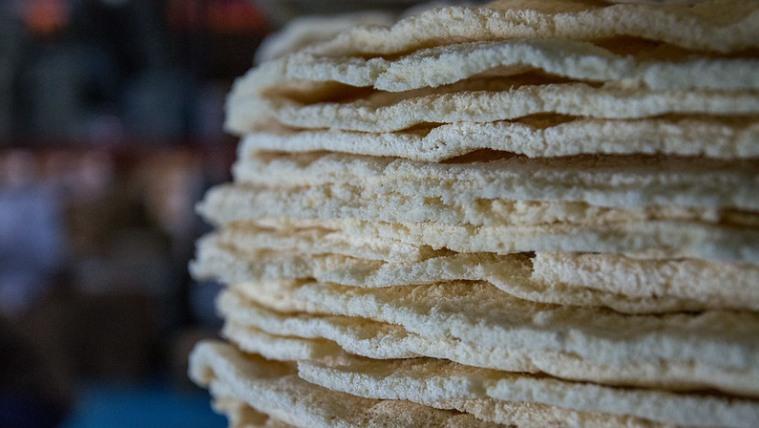
Holii, hoy quiero hacer un blog distinto a lo habitual debido a que mi papá trabaja en una marca bastante reconocida en el país debido a que son uno de las pocas empresas que comercializan el casabe, aquí en Venezuela, llamada Casabe Gourmet.
Esto ha hecho que pueda degustar de distintas maneras dicho producto y me sorprendió la variedad de usos que tiene.
Quise hacerle una entrevista grabada a la generante general de dicha empresa como al coordinador de ventas (mi papá) pero por temas de privacidad y permisos, decidí hacer una entrevista escrita.
Hii, today I want to do a different blog than usual because my dad works in a very well known brand in the country because they are one of the few companies that sell cassava, here in Venezuela, called Casabe Gourmet.
This has allowed me to taste this product in different ways and I was surprised by the variety of uses it has.
I wanted to do a recorded interview with the general manager of the company and the sales coordinator (my dad) but due to privacy and permissions issues, I decided to do a written interview.

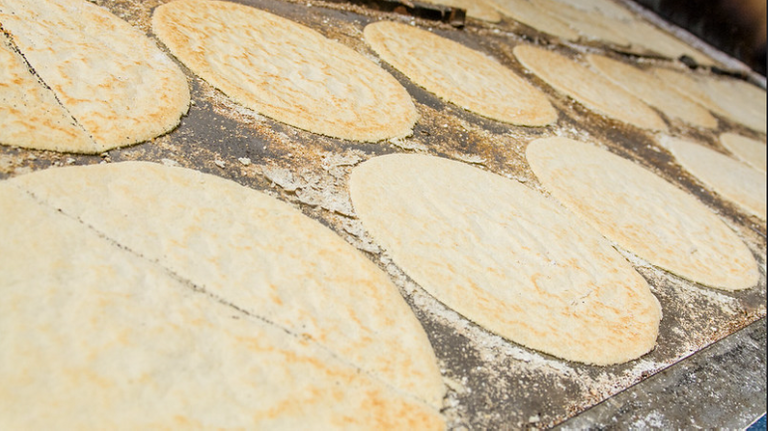
Antes de cualquier cosa debemos explicar:
¿Qué es el casabe?
Es un pan ácimo, es decir, sin levadura; está fabricado a partir de la yuca por lo que es ideal para las personas celiacas en la preparación de distintos alimentos.
Este se prepara moliendo la yuca amarga para extraerle el Acido Cianhídrico (también conocido como Yare, que es su nombre indígena) el cual es el veneno natural de este tipo de yuca amarga.
Es un producto que se conserva por mucho tiempo al no ser perecedero, siempre y cuando no esté expuesto a humedad, así que lo hace un alimento ideal para muchas situaciones y personas. Es completamente natural, no posee ningún componente químico como conservantes, colorantes, entre otros.
Before anything else we must explain:
What is cassava?
It is an unleavened bread, that is to say, without yeast; it is made from yucca, which makes it ideal for celiac people in the preparation of different foods.
It is prepared by grinding the bitter yucca to extract the Hydrocyanic Acid (also known as Yare, which is its indigenous name) which is the natural poison of this type of bitter yucca.
It is a product that can be preserved for a long time because it's not perishable, as long as it's not exposed to humidity, which makes it an ideal food for many situations and people. It is completely natural, it doesn't have any chemical components such as preservatives, colorants, among others.

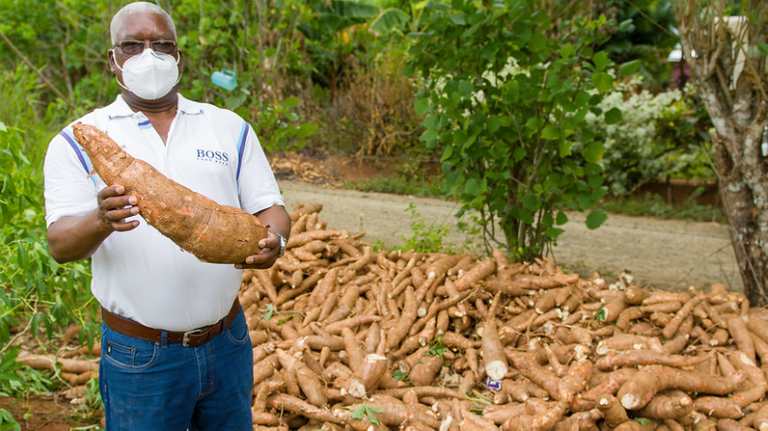
¿Por qué el casabe se hace con yuca amarga específicamente y no normal?
Por rendimiento, sí existe casabe con yuca dulce, pero es un sabor muy distinto al que se está acostumbrado.
La yuca amarga rinde mucho más a la hora de la fabricación del casabe, también por temas de conveniencia debido a que la yuca dulce se puede consumir de distintas maneras, en cambio, la yuca amarga no se puede consumir en su estado natural al ser venenosa.
Why is cassava made with bitter cassava specifically and not regular cassava?
By yield, cassava with sweet cassava does exist, but it is a very different flavor from the one we are used to.
The bitter yucca yields much more at the time of the manufacture of the cassava, also for convenience issues because the sweet yucca can be consumed in different ways, on the other hand, the bitter yucca cannot be consumed in its natural state because it is poisonous.

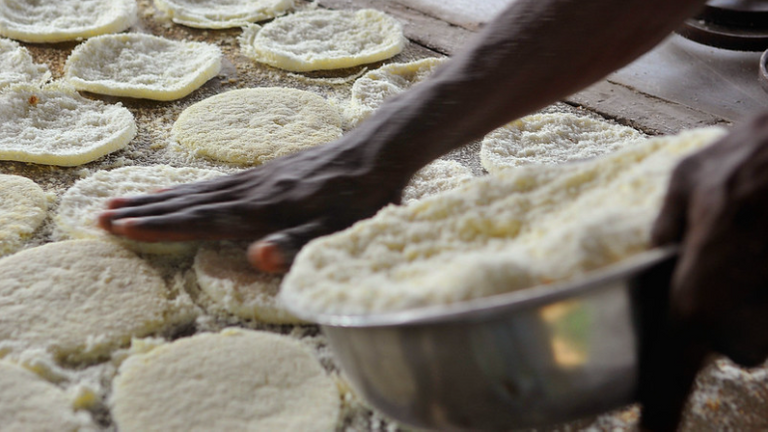
¿Qué ofrece el casabe nutricionalmente?
Es libre de gluten, lo cual lo hace ideal para las personas que son intolerantes a este y a las celiacas; a los niños que padecen autismo, les recomiendan consumir bajas cantidades de gluten.
En comparación a otros carbohidratos como el maíz, pan, arroz o papa, tiene un mayor aporte calórico y energético; ofrece al rededor de 343 calorías/100g y a pesar que es bajo en proteína ofrece un alto contenido de glúcidos, los cuales son esenciales en una dieta balanceada.
Aporta mayor cantidad de fibra, por encima de la avena, el pan y/o el arroz; es una perfecta alternativa para estos alimentos debido a lo mucho que ofrece y lo bueno que es para nuestra dieta diaria.
What does cassava offer nutritionally?
It is gluten-free, which makes it ideal for people who are intolerant to gluten and celiac disease; children suffering from autism are recommended to consume low amounts of gluten.
Compared to other carbohydrates such as corn, bread, rice or potato, it has a higher caloric and energetic contribution; it offers around 343 calories/0.2 grams and although it is low in protein, it offers a high content of carbohydrates, which are essential in a balanced diet.
It provides more fiber than oatmeal, bread and/or rice; it is a perfect alternative to these foods because of how much it offers and how good it is for our daily diet.

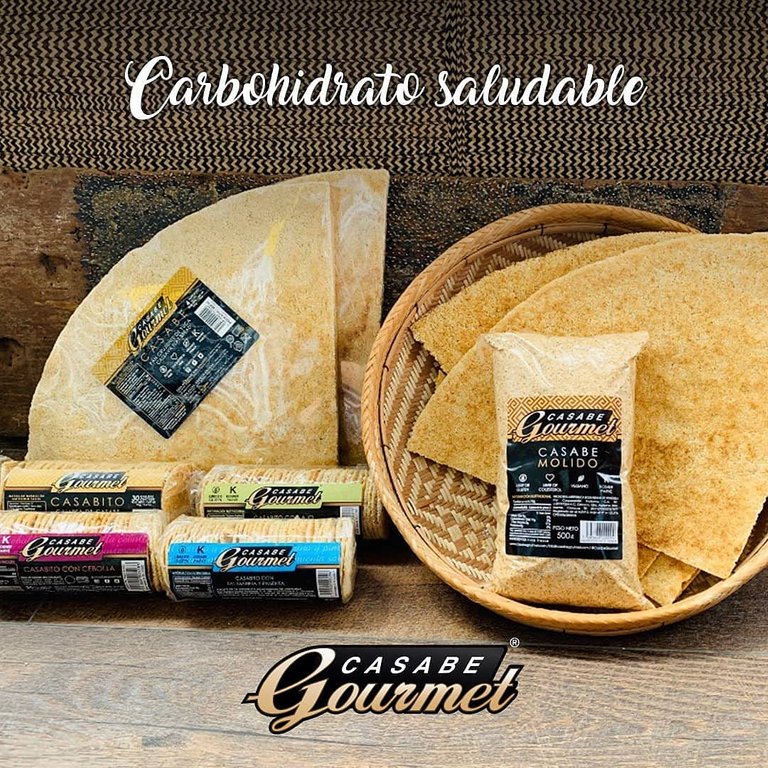
¿Cuántas presentaciones puede tener el casabe?
En Venezuela se pueden encontrar bastantes tipos de presentaciones, desde las tortas enteras típicas, que son como una tortilla gigante, hasta las presentaciones más pequeñas que sirven como acompañante para una comida o los famosos snack.
Al tener un sabor neutro se puede combinar con distintos sabores, desde dulces hasta salados; puedes acompañarlo con queso crema, mermelada, chocolate, salsa de ajo y hasta se encuentra una versión fabricada con papelón.
Acá en el país existe una gran variedad de presentaciones del casabe, se pueden encontrar saborizados con ajo, cebolla, sal y pimienta o hasta con ajonjolí.
Con respecto a el grosor de el casabe, también hay variedad, existen casabes gruesos y los que se conocen como "tipo galleta" los cuales son muchos más delgados y tienden a ser más crujientes por el grado de tostado que llevan; regularmente los tipo snack tienden a ser los tipo galletas al ser solo acompañantes.
How many presentations can cassava have?
In Venezuela you can find many types of presentations, from the typical whole cakes, which are like a giant tortilla, to smaller presentations that serve as an accompaniment to a meal or the famous snacks.
As it has a neutral flavor, it can be combined with different flavors, from sweet to salty; you can accompany it with cream cheese, jam, chocolate, garlic sauce and there is even a version made with sugarloaf.
Here in the country there is a great variety of cassava presentations, you can find them flavored with garlic, onion, salt and pepper or even with sesame seeds.
Regarding the thickness of the cassava, there is also variety, there are thick cassava cassavas and those known as "cookie type" which are much thinner and tend to be crunchier due to the degree of toasting they have; regularly the snack type tend to be the cookie type as they are only accompaniments.

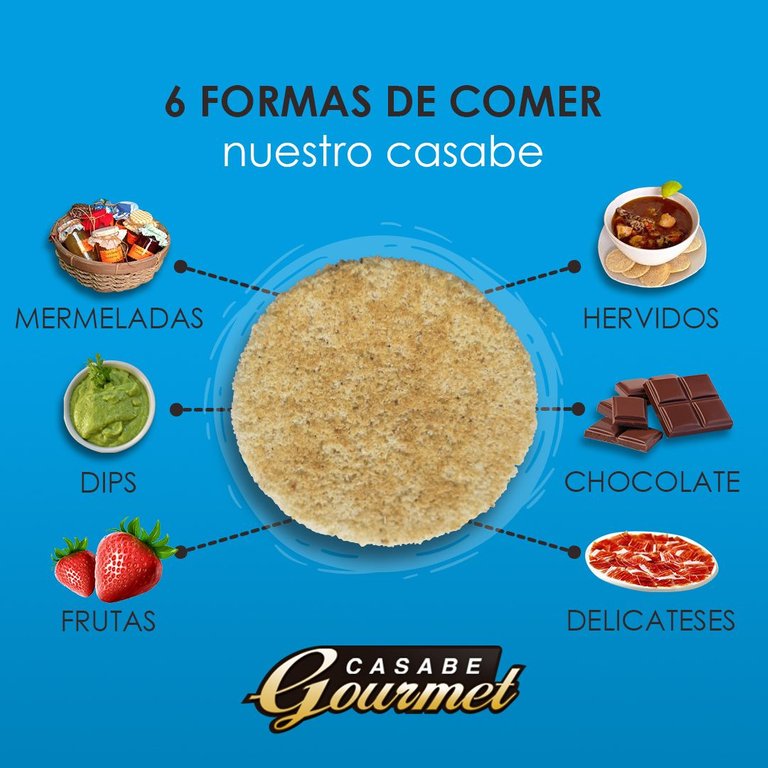
¿Cuáles son los diferentes usos del casabe?
El casabe molido es perfecto para rebozar alimentos como el pollo, la carne o pescado; le da un una mayor croncancia al alimento y, como absorbe menos aceite, es mucho más sano. Al ser un producto con un sabor muy neutro, no altera el gusto de la proteína.
Las tortas tradicionales de casabe se pueden utilizar como base de pizza y quedan mucho más crocantes como deliciosas. Se puede utilizar también como acompañantes a toda variedad de comidas o platillos.
Otra manera de utilizarlo es como espesantes de salsas en vez de la fécula de maíz, como la salsa del pollo, salsas para aderezar, igualmente se puede utilizar para espesar caldos, entre otros muchos usos.
What are the different uses of cassava?
Ground cassava is perfect for breading foods such as chicken, meat or fish; it gives a greater chronicity to the food and, as it absorbs less oil, it is much healthier. Being a product with a very neutral flavor, it does not alter the taste of the protein.
Traditional cassava cakes can be used as a pizza base and are much more crunchy and delicious. It can also be used as an accompaniment to a variety of meals or dishes.
Another way to use it is as a thickener for sauces instead of corn starch, such as chicken sauce, sauces for seasoning, it can also be used to thicken broths, among many other uses.

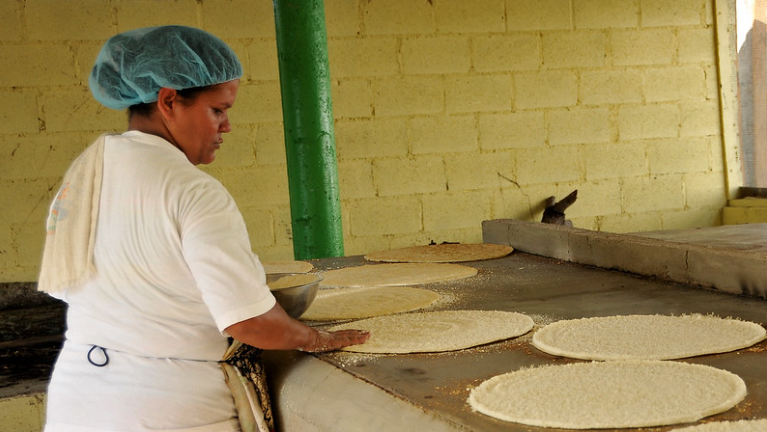
¿Por qué el casabe no es tan famoso como otras comidas típicas venezolanas?
Porque nunca se había comercializado apropiadamente debido a que es un producto artesanal y su manufactura no era de manera masiva, como también, ha sido opacada por la presencia de la harina de maíz precocido porque era mucho más sencillo su adquisición.
Actualmente la comercialización está mucho más expandida debido a que se ha comprobado que es mucho más sano y tiene una gran variedad de usos en la cocina.
Why is cassava not as famous as other typical Venezuelan foods?
Because it had never been properly marketed due to the fact that it is a handmade product and its manufacture wasn't massive, as well as, it has been overshadowed by the presence of precooked corn flour because it was much easier to acquire.
Currently, its commercialization is much more expanded because it has been proved that it is much healthier and has a great variety of uses in the kitchen.

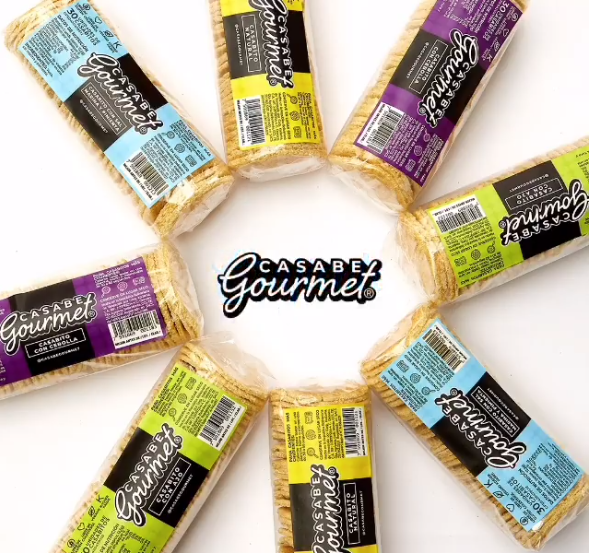
¿Cuál es el precio del casabe en el mercado venezolano?
El precio varia según su presentación, se puede conseguir de manera tradicional y su precio aproximado oscila en 1$ con unos cuantos céntimos; se puede conseguir la torta del mismo tamaño pero dividida en 4 porciones como embalada por un precio aproximado de 2.20$ y también se puede encontrar en la presentación tipo snack la cual se encuentra en 1.60$ y esta trae 30 unidades.
What is the price of cassava in the Venezuelan market?
The price varies according to its presentation, it can be obtained in the traditional way and its approximate price oscillates in 1$ with a few cents; you can get the cake of the same size but divided in 4 portions as packaged for an approximate price of 2.20$ and it can also be found in the snack type presentation which is found in 1.60$ and this one brings 30 units.

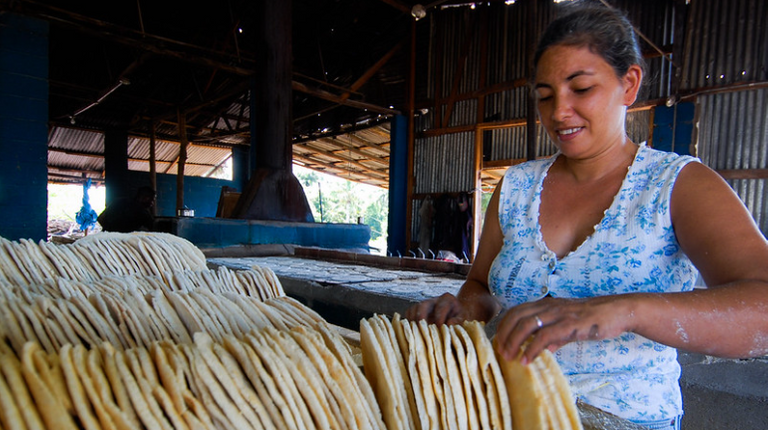
El casabe es un producto netamente venezolano pero, gracias a la expansión del mercado, se elabora en distintos países como Republica Dominicana y muy poco en Brasil.
Este es un producto no muy conocido y/o consumido pero, que sin dudas, debería serlo gracias a todo lo que ofrece y lo versátil que es.
Como consumidora frecuente del casabe puedo decir, con honestidad, que es mucho mejor que muchas harinas que se comercializan regularmente.
Gracias por leerme, nos vemos pronto💙
The cassava is a purely Venezuelan product but, thanks to the expansion of the market, it is made in different countries such as the Dominican Republic and very little in Brazil.
This is a product that isn't very well known and/or consumed but, without a doubt, it should be thanks to all that it offers and how versatile it is.
As a frequent consumer of cassava I can honestly say that it is much better than many flours that are regularly marketed.
Thank you for reading me, see you soon💙


